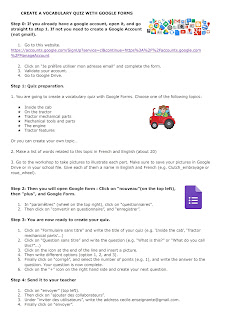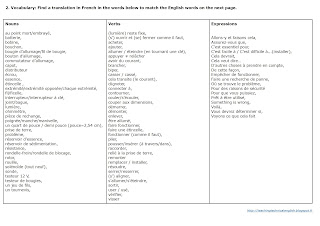Students practice their pronunciation and listening skills and learn how to use present perfect progressive, since and for to talk about what they have been doing. They also learn how to introduce themselves in a formal situation such as a presentation or their end-of-year speaking exam.
I wrote a first post last year on a TEDx talk whose first minute and a half I found particularly interesting to learn useful expressions for oral presentations.(TEDx Oral Presentations Listening and Speaking Skills Lesson)
This post is about the same chunk of the video, except the activities focus on pronunciation and intonation, with an expressive reading as a final task - the point being to get the students to use everything they will have learnt throughout the exercises during the expressive reading.
It can be followed by a lesson on present perfect progressive, since, for and other time expressions to enable students to talk about what they have been doing and for how long. They often have to use this grammar point/time expressions when they talk about themselves if they want to say for instance 'I have been studying farm equipment for two years' or 'I have been working for this farm equipment dealer since 2015'.
Finally, I asked the students to write a script for a 2 minutes presentation, and to perform it in front of the class in the TEDx talk style.
PUSHING THE BOUNDARIES IN AGRICULTURE
- Listen and complete the text
Good day everyone, _________________________ with you. _____________ Rob Saik and as mentioned I’m a _______________ _______________ and a certified _____________ ________________. The _______________ of Agritrend, a company that has over 250 ________________ that work ___________________ with farmers throughout North America and _______________________.
We ____________ farmers with ________________, we _________________ farmers with scientific integration. I have 30 PhDs and 58 Masters in our ________________. And a Data platform that has nearly ____________________ acres of data.
So we understand __________________. I’ve been blessed to _____________________________ to work directly __________________ with _______________ from Ukraine, Kazakhstan, Russia, Uganda, Peru, Brazil, Argentina, all the way down to New Zealand, and Australia, all throughout North America, Mexico, and most recently just __________________ from Kenya and Uganda. This is a _____________ of me working ________________, doing a ______________ inventory in Kenya.
See I’ve a ________________ for you and I’m gonna use this picture as a __________________. This is a ____________ and a ____________ near Lodwar in the north eastern corner of Kenya. And it’s a ___________________ because we ______________ to ________ these people and at the same time we _____________ technology. Notice in her hand, she has ___________________. And so my ________________to you is: “Do you ______________ that agriculture can ___________ 9 billion people? Do you __________________ that? That’s not the real question. The real question is ___________: “Will agriculture be _____________to feed 9 billion people?”.”
2. Listen and underline the stressed syllable
professional
certified
agricultural
consultant
company
America
internationally
|
farmers
understand
recently
picture
technology
question
believe
|
Ukraine
Kazakhstan
Russia
Peru
Brazil
Argentina
New Zealand
Australia
Mexico
|
3. How does Rob Saik pronounce the following words? why?
INTERNATIONALLY
|
INTEGRATION
|
DATA
|
METAPHOR
|
NOTICE
|
THIRTY SEVENTY
4. Put the words in the right column.
great, certified, integration, directly, Russia, arriving, field, child, feed, these, people, time, need, question, believe, actually
/ei/ (day)
|
/ai/ (my)
|
/i:/ (read)
|
/ch/
|
5. Listen and underline the stressed words in the sentence.
We help farmers with coaching
See I’ve a question for you
we have to feed these people and at the same time we need technology
Do you believe that?
6. Listen and practice reading the following text. Then record yourself.
Good day everyone, it’s great to be with you. My name’s Rob Saik / and I’m a professional agrologist / and a certified / agricultural consultant. The founder of Agritrend.
We help farmers with coaching, we help farmers with scientific integration.
So we understand farming. I’ve been blessed to travel around the world / to work directly on the ground with farmers / from Ukraine, Kazakhstan, / Russia, Uganda, Peru, / Brazil, Argentina, / all the way down to New Zealand,/ and Australia. This is a picture of me / working in the field, doing a soil inventory in Kenya.
See I’ve a question for you / and I’m gonna use this picture as a metaphor. This is a woman and a child. And it’s a metaphor / because we have to feed these people / and at the same time / we need technology. Notice in her hand, she has a cellular phone. And so my question to you is: “Do you believe that agriculture / can feed 9 billion people? Do you believe that?”.
Talk about what you have been doing
(for/since/expressions of time)
- Present perfect progressive / for / since
|
|
Le 'present perfect progressive' se forme de cette façon:
……………….. + ………………………. + ………………………… + ………………………….
| |
For +...........................
|
Since + ……………………………….
|
- Expressions of time (Vocabulary Revisions). How do you say...?
heure
jour
semaine
mois
années
décénie
siècle
|
ce mois-ci
la semaine dernière
l’année prochaine
hier
avant-hier
aujourd’hui
demain
après-demain
|
- Translate the following sentences:
- Je travaille ici depuis le mois dernier.
- Je conduis des tracteurs depuis l'âge de 10 ans.
- J’étudie ici depuis 4 ans.
- Je regarde la télé depuis 1 heure.
- Je cuisine depuis 20 minutes.
- Je joue de la guitare depuis 2014.
- Je fais du camping depuis avant-hier.
The full transcript:
Good day everyone, it’s great to be with you. My name’s Rob Saik and as mentioned I’m a professional agrologist and a certified agricultural consultant. The founder of Agritrend, a company that has over 250 people that work on the ground with farmers throughout North America and internationally.
We help farmers with coaching, we help farmers with scientific integration. I have 30 PhDs and 58 Masters in our organization. And a Data platform that has nearly 70 million acres of data.
So we understand farming. I’ve been blessed to travel around the world to work directly on the ground with farmers from Ukraine, Kazakhstan, Russia, Uganda, Peru, Brazil, Argentina, all the way down to New Zealand, and Australia, all throughout North America, Mexico, and most recently just arriving back from Kenya and Uganda. This is a picture of me working in the field, doing a soil inventory in Kenya.
See I’ve a question for you and I’m gonna use this picture as a metaphor. This is a woman and a child near Lodwar in the north eastern corner of Kenya. And it’s a metaphor because we have to feed these people and at the same time we need technology. Notice in her hand, she has a cellular phone. And so my question to you is: “Do you believe that agriculture can feed 9 billion people?”Do you believe that?” That’s not the real question. The real question is actually: “Will agriculture be allowed to feed 9 billion people?”.
The video:
The worksheet:
The audio files:
Cécile Sohier





